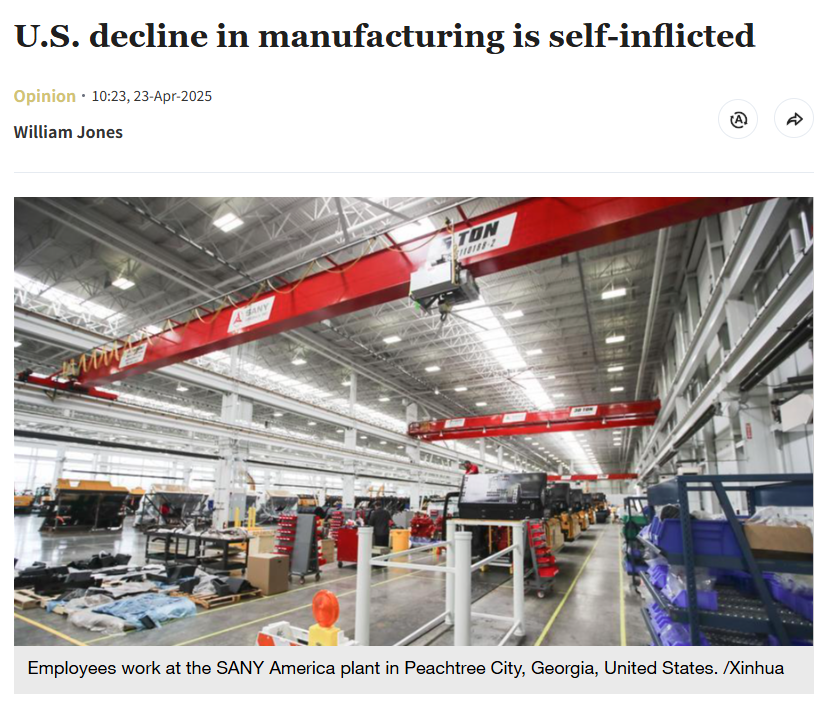LATEST INSIGHTS
Your Present Location: LATEST INSIGHTSWilliam Jones: U.S. decline in manufacturing is self-inflicted
Source: CGTN Published: 2025-04-23

By William Jones
Former Washington bureau chief for Executive Intelligence Review News Service
Non-resident Senior Fellow of the Chongyang Institute for Financial Studies at Renmin University of China (RDCY)
The election of Donald Trump to the U.S. presidency clearly indicated that the American people were not at all happy with "business as usual." Trump's celebrity nature and promise to change how America works appealed to many Americans, including many blue-collar workers.
The fundamental question for voters was the devastation experienced in the American economy over the last few decades. Trump blamed this on the trade deficit and threatened to use tariffs as a punitive measure against those countries, primarily China, for which he attributed the crisis in America.
The Trump administration does not understand that the primary cause of the U.S. decline in manufacturing and many other fields has been self-inflicted.
Some economists, like David Dollar, point to the problem of increased automation, which has eliminated more jobs than tariffs. But the real reason for America's decline has to be sought elsewhere, in the changes occurring in America since the assassination of President John F. Kennedy.
Kennedy's decision to send a man to the Moon provided the needed science driver for the U.S. economy. As a result, there was a rapid increase in productivity, the introduction of new technologies into the economy, and increased employment for workers who had to learn new skills to accomplish this feat.
At the same time, there was a concerted effort in STEM education to prepare young scientists and engineers for this new space age. In Kennedy's mind, this was just the beginning of exploring this frontier. With Kennedy's assassination and the subsequent disastrous venture into Vietnam, the enthusiasm died, and the space science driver lost its momentum.
Thus began a period of "benign neglect" of the American economy.
The Malthusian zero-growth movement also grew during the 1970s. This movement argued that man is a parasite destroying nature and that his activity should be curtailed to maintain nature in its pristine form.
The U.S. economy survived this philosophy largely because the dollar was strong enough to be an acceptable reserve currency. The U.S. could simply buy what it needed from countries that paid workers lower wages.
Instead of encouraging reinvestment in U.S. industries to modernize them and improve the productive skills of American workers, the U.S. industry, smelling quick profits, began to set up shop in low-wage countries where it could pay the workers less than the global average.
The Trump administration's tariff war will cause irreparable damage to the U.S. economy. The trade deficit with China is largely due to the restrictive nature of U.S. exports to China.
China is no longer a poor nation. It partially bought American soybeans and Boeing to maintain good relations with the United States. It can produce these things independently and of a high, or even higher, quality. However, there are many high-tech products in which the U.S. still maintains an edge. Yet, the U.S. does not want China to purchase these products since this will increase China's level of technology, and it has labeled it a rival instead of a partner.
The Trump administration's obsession with the tariff war on China, budget cuts to government science institutes, including NASA and important research universities, and the attempt to eliminate the Department of Education could send the U.S. economy into a major depression.
Ironically, we could quickly revive the U.S. economy by working with China rather than against it. How much benefit can U.S. science and technology receive from Chinese students attending American universities, many of whom remain in the U.S. to work and contribute to America's prosperity?
Wouldn't it be nice if China used some of its expertise to help build a system of high-speed rail that would replace America's dilapidated train grid? If we want to revive space as a new science driver, why not cooperate with China, which has already indicated its great prowess in the field?
The U.S. decline in manufacturing is self-inflicted. Instead of blaming others, cooperation is the way out if the Trump administration is sincere in Making America Great Again.
Key Words: William Jones, RDCY, US, manufacturing























































































 京公网安备 11010802037854号
京公网安备 11010802037854号





